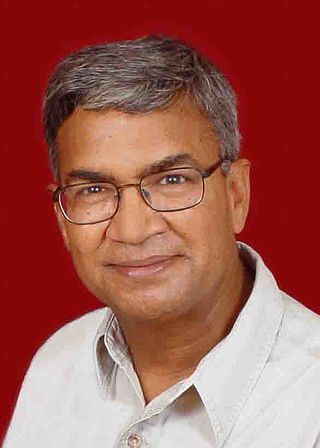
Edmund Gustav Albrecht Husserl was an Austrian-German philosopher and mathematician who established the school of phenomenology.
In its most common sense, philosophical methodology is the field of inquiry studying the methods used to do philosophy. But the term can also refer to the methods themselves. It may be understood in a wide sense as the general study of principles used for theory selection, or in a more narrow sense as the study of ways of conducting one's research and theorizing with the goal of acquiring philosophical knowledge. Philosophical methodology investigates both descriptive issues, such as which methods actually have been used by philosophers, and normative issues, such as which methods should be used or how to do good philosophy.
Phenomenology is the philosophical study of the structures of experience and consciousness. As a philosophical movement it was founded in the early years of the 20th century by Edmund Husserl and was later expanded upon by a circle of his followers at the universities of Göttingen and Munich in Germany. It then spread to France, the United States, and elsewhere, often in contexts far removed from Husserl's early work.
Philosophy of psychology is concerned with the philosophical foundations of the study of psychology. It deals with both epistemological and ontological issues and shares interests with other fields, including philosophy of mind and theoretical psychology. Philosophical and theoretical psychology are intimately tied and are therefore sometimes used interchangeably or used together. However, philosophy of psychology relies more on debates general to philosophy and on philosophical methods, whereas theoretical psychology draws on multiple areas.

In its most common sense, methodology is the study of research methods. However, the term can also refer to the methods themselves or to the philosophical discussion of associated background assumptions. A method is a structured procedure for bringing about a certain goal. In the context of research, this goal is usually to discover new knowledge or to verify pre-existing knowledge claims. This normally involves various steps, like choosing a sample, collecting data from this sample, and interpreting this data. The study of methods involves a detailed description and analysis of these processes. It includes evaluative aspects by comparing different methods to assess their advantages and disadvantages relative to different research goals and situations. This way, a methodology can help make the research process efficient and reliable by guiding researchers on which method to employ at each step. These descriptions and evaluations of methods often depend on philosophical background assumptions. The assumptions are about issues like how the studied phenomena are to be conceptualized, what constitutes evidence for or against them, and what the general goal of research is. When understood in the widest sense, methodology also includes the discussion of these more abstract issues.
The Graz School, also Meinong's School, of experimental psychology and object theory was headed by Alexius Meinong, who was professor and Chair of Philosophy at the University of Graz where he founded the Graz Psychological Institute in 1894. The Graz School's phenomenological psychology and philosophical semantics achieved important advances in philosophy and psychological science.

Max Ferdinand Scheler was a German philosopher known for his work in phenomenology, ethics, and philosophical anthropology. Considered in his lifetime one of the most prominent German philosophers, Scheler developed the philosophical method of Edmund Husserl, the founder of phenomenology. Given that school's utopian ambitions of re-founding all of human knowledge, Scheler was nicknamed the "Adam of the philosophical paradise" by José Ortega y Gasset.

Wilhelm Windelband was a German philosopher of the Baden School.
Neurophenomenology refers to a scientific research program aimed to address the hard problem of consciousness in a pragmatic way. It combines neuroscience with phenomenology in order to study experience, mind, and consciousness with an emphasis on the embodied condition of the human mind. The field is very much linked to fields such as neuropsychology, neuroanthropology and behavioral neuroscience and the study of phenomenology in psychology.
In Hellenistic philosophy, Epoché is suspension of judgment but also as "withholding of assent".
Phenomenology or phenomenological psychology, a sub-discipline of psychology, is the scientific study of subjective experiences. It is an approach to psychological subject matter that attempts to explain experiences from the point of view of the subject via the analysis of their written or spoken word. The approach has its roots in the phenomenological philosophical work of Edmund Husserl.
Marc Jean-Bernard is a French philosopher, academic, writer, and classical guitarist. Among his main academic interests are Latin American culture, musicology, aesthetics, diplomatic dialogue, philosophy of music, and the hermeneutics of culture. He is currently based at the University of Puerto Rico in San Juan.
Juha Varto is a Finnish philosopher, considered the most important phenomenologist in Finland, known also for his prolific output on a variety of philosophical themes. Since 1999 he has been professor of research in visual art and education at the Aalto University School of Art and Design, Helsinki. Before that he taught research methodology and acted as director of research in various Finnish universities and polytechnics (1992–1999) and before that taught philosophy at the University of Tampere (1973–1993). During the 1990s Varto produced over 100 programmes for Finnish radio and television, mainly dealing with philosophical questions. He has been awarded an honorary doctorate for theatre and drama by the Theatre Academy Helsinki. Autumn 2016, the president of Aalto University, Tuula Teeri, appointed Varto an Aalto Distinguished Professor in recognition of his significant scientific merits.
Steve Frederic Sapontzis is an American philosopher and professor emeritus of philosophy at California State University, East Bay who specializes in animal ethics, environmental ethics and meta-ethics.

Michael Huemer is a professor of philosophy at the University of Colorado, Boulder. He has defended ethical intuitionism, direct realism, libertarianism, veganism, and philosophical anarchism.
The Institut supérieur de Philosophie (ISP) is an independent research institute at the University of Louvain (UCLouvain) in Louvain-la-Neuve, Belgium. It is a separate entity to the UCLouvain School of Philosophy.

Yvanka B. Raynova is a Bulgarian philosopher, feminist, editor, translator, and publisher. She is full professor of contemporary philosophy at the Institute of Philosophy and Sociology at the Bulgarian Academy of Sciences and director of the Institute for Axiological Research in Vienna. She elaborated a post-personalist hermeneutic phenomenology based on some gnostic ideas. Her works include studies on continental philosophy, phenomenology, hermeneutics, axiology, feminist philosophy, intercultural philosophy, religious studies, and translation studies.

Anil K. Gupta is an Indian-American philosopher who works primarily in logic, epistemology, philosophy of language, and metaphysics. Gupta is the Alan Ross Anderson Distinguished Professor of Philosophy at the University of Pittsburgh. He is also a Fellow of the American Academy of Arts and Sciences. His most recent book, Conscious Experience: A Logical Inquiry, was published by Harvard University Press in 2019.
Jennifer Nagel is a Canadian philosopher at the University of Toronto. Her research focuses on epistemology, philosophy of mind, and metacognition. She has also written on 17th century (Western) philosophy, especially John Locke and René Descartes.






